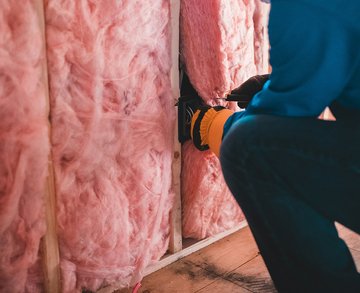With energy prices rising, we’re all looking for ways to save money on the cost of running our homes.
From checking your appliances to boosting your insulation, here’s 22 ways to protect your home from the rising cost of living.
Use energy-efficient appliances
1. Assess your appliances
Assessing your appliances can help you to enjoy greater energy efficiency in your home.
The consumer group Which? estimated that based on April’s energy price, people using the least efficient domestic appliances were spending £550 a year more than those using the most energy-efficient ones.
A first rule is not to rush out and buy a new model until your old one is at the end of its lifespan. If you haven’t bought an appliance in the past year, you may be flummoxed by the new A to G rating system that came in last March. This means that reasonably efficient appliances are now (confusingly) rated D, whereas these are in fact among the most cost-effective currently available. Very few models yet make the B or even A grade — and those that do tend to be very expensive. Prioritise the appliances you use the most.
2. Your freezer
To keep it from using more energy than necessary, defrost your freezer when the ice has built up to around a centimetre. Some new models have a holiday mode, which are ideal when there’s no food in your fridge. It’ll keep the freezer on but turn the fridge off.
3. Your kettle
Kettles are one of the most intensive energy guzzlers. When limescale builds up, it causes the kettle to use even more energy, so be sure to descale it regularly.
The average household boils a kettle four times a day but often uses more water than is required. Only boiling what you need could save you as much as £50 a year.
4. Your tumble dryer
Using your tumble dryer three times a week could cost you more than £200 a year. Drying your washing on a clothesline is free. If you’re drying indoors, ensure the room is well-ventilated to avoid damp. Try using a rapid spin-cycle on the washing machine to remove as much water as possible too before hanging your clothes to dry.
For large items like towels or duvet covers, consider using your local launderette’s tumble dryers instead: they may sound like a blast from the past but new ones with a modern community feel — some even do great coffee while you wait — charge very little for their services.
5. Your oven
After kettles and tumble dryers, ovens rank third on the list of energy-using appliances. Self-cleaning ones are the best insulated and therefore the most efficient (but don’t use the self-cleaning function as it uses a lot of energy).
The fan function is more efficient as it cooks at lower temperatures. When you use your oven, try to fill it to capacity: batch cook and freeze the extra portions.
6. Your microwave
Switch off your microwave when it’s not in use. Its digital display and lightbulb use energy when left on standby mode.
7. Your lightbulbs
If you haven’t already switched to LED, now would be a good time. One LED bulb, used for ten hours a day, will cost you £10.22 for the year.
One halogen bulb will cost £42.92 per year, whilst one incandescent bulb will cost £61.32 per year. Multiplied by ten bulbs for a house, you could save nearly £500 a year.
8. Your TV
The size and brightness of your TV will affect its running cost, so try turning down the brightness. Digital boxes can cost as much as £40 a year when left on standby. Turn them off at the mains when not in use if you can.
9. Your washing machine
Washing at low temperatures takes less time, saves you money and is better for your clothes.
Add an anti-bacterial rinse aid or just a capful of white vinegar to kill bacteria that survive at low temperatures. Run it on a hot wash (90C) once a month to kill off bugs and smells.
At least four times a year, descale your machine to prevent corrosion of the heating element. Remember to clear the machine’s filter from rogue coins, lint and detergent residue as well.
10. Your dishwasher
The good news is that the most efficient dishwashers on a full load save water over hand-washing.
Once a month, clean the dishwasher. Put a bowl of white vinegar in the upper rack and run a hot cycle; then sprinkle bicarbonate of soda over the bottom of the appliance. Run a short, hot cycle to leave it fresh. Clean out the filter too — a clean machine always costs less to run.
11. Your shower
Fitting a low-flow shower head can save thousands of litres of water and will quickly pay for itself.
Reduce heat loss
Preventing draughts throughout your home will trap heat inside and save energy.
12. Draughts
Draught-proofing around windows and doors could save you about £45 a year. Also consider fitting a letterbox draught excluder.
13. Top-up loft insulation
Top up your loft insulation to prevent needlessly losing heat through the roof
According to the Energy Saving Trust (EST), a quarter of heat — worth up to £580 a year — is lost through the roof in an uninsulated home. It estimates that a third of homes still have less than 150mm of loft insulation. Top up yours to the recommended 270mm (from £500). It will pay for itself within a year or two.
14. Insulate floors
Easily fill gaps between bare floorboards with floorboard gap filler. Good underlay beneath carpets, laminate or vinyl flooring also helps.
Optimise heating
15. Your boiler
Arrange for your home’s boiler to be serviced to make sure that it’s running safely and efficiently.
Outside pipes should be insulated to protect from freezing. Wrapping the hot water tank in an 8cm-thick jacket (about £17) saves £35 off your annual energy bills, according to the EST.
If your boiler is at the end of its life, and you have a well-insulated home with underfloor heating, consider switching to a heat pump — funded for up to £5,000 under the government’s boiler replacement scheme.
16. Your radiators
The optimum room temperature is 18-21 degrees, but choosing to reduce that by 1 degree could cut your annual heating bills by as much as £128, according to Uswitch. Put reflector panels behind radiators to reduce heat loss through external walls.
17. Your heating controls
Fit thermostatic radiator valves (TRVs) to control the temperature of individual rooms — they cost less than £10 and installation is a simple DIY job. Don’t put furniture or long curtains in front of TRVs: this stops them from reading the room temperature correctly.
Prevent problems
As the old saying goes, prevention is better than cure.
18. Prevent damp
The longer you leave damp, the more costly it is to fix. Check your home for clogged air bricks and gutters. Black mould, flaking paint, peeling plaster and a musty smell can suggest that damp has taken hold.
Condensation from moisture in the air is the most common cause. Ventilate, especially in bathrooms and kitchens.
19. Inspect your roof
Check inside the loft for leaks, before it starts dripping through the ceiling.
From outside, look for loose mortar at junctions and cracked, slipped or missing tiles — replace these to stop leaks and prevent more tiles from being dislodged. Excessive moss can cause damp; brush it down. On flat roofs, check for standing water.
20. Locate your stopcock
Knowing where the stopcock is — used to turn off the water supply to your home — can save you hundreds of pounds of water damage if a pipe bursts. Check that it is not stuck from disuse.
21. Sweep the chimney
Items in chimneys can cause fires and harbour pests, so clear anything away to prevent this. Find a qualified sweep near you at the National Association of Chimney Sweeps (nacs.org.uk).
22. Check for pests
Hot summers increase the likelihood of pests. The webbing clothes moth tops a National Trust list of the worst culprits feasting on our curtains and clothes.
Local and trusted expertise to sell your home
If your home is energy-efficient and comes without small maintenance issues, it could be worth more than you think. As local estate agents in Cheltenham, Worcester, Stroud and Gloucester, if you’re thinking of selling or letting your property, speak to our valuation experts. We can advise you on further ways to add value to your home, as well as how to achieve the best possible price.
Book a free, no-obligation valuation with our team today.





